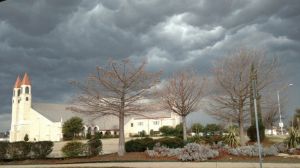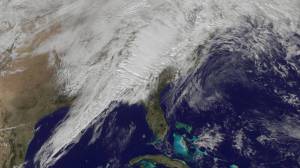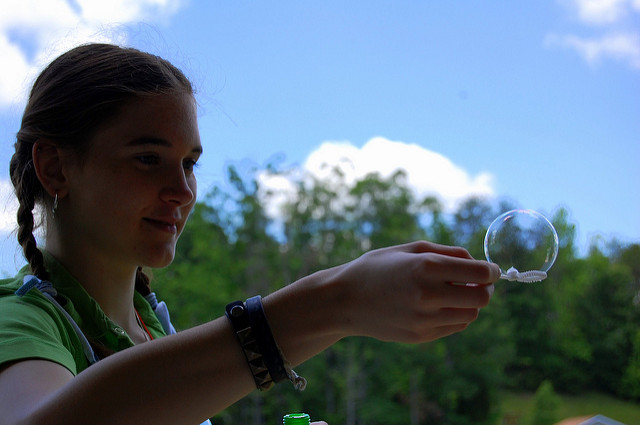Use the guide below to discuss tornado safety with your host family. Request a meeting to discuss where you would go inside their home and what they expect from you when a warning or a watch is given in your area.
What you need to know about Tornadoes:
What is a Tornado?

A tornado is a violently rotating column of air extending between, and in contact with, a cloud and the surface of the earth. Tornadoes are generally spawned by thunderstorms, though they have been known to occur without the presence of lightning. The stronger tornadoes attain an awe-inspiring intensity, with wind speeds that exceed 200 mph and in extreme cases may approach 300 mph.
The United States has the highest incidence of tornadoes worldwide, with about 1,000 occurring every year. Tornadoes touch down in the Atlanta area each year.
According to Stu Ostro, a Senior Weather Specialist at The Weather Channel, this is due to the unique geography that brings together polar air from Canada, tropical air from the Gulf of Mexico, and dry air from the Southwest to clash in the middle of the country, producing thunderstorms and the tornadoes they spawn.
Tornadoes can come one at a time, or in clusters, and they can vary greatly in length, width, direction of travel, and speed. They can leave a path 50 yards wide or over a mile wide. They may touch down for only a matter of seconds, or remain in contact with the ground for over an hour.
How do I know if a tornado will touch down where I live?
The National Weather Service broadcasts severe weather conditions on radio, TV, or on NOAA Weather Radio. Every host family should have a NOAA weather radio in the home or a weather alert app on their phone. The radio or phone app makes a loud alert sound, letting you know there is an emergency. Ask your host parents to make sure your have this app. Some areas of Atlanta have outside warning sirens. This is a very loud alert sound outside. The siren is activated when a tornado has been sighted in the specific area.

How does an au pair in your home know there is a watch or warning?
A tornado WATCH means conditions are right for a tornado to occur. A tornado WARNING means a tornado has been sighted in the posted area or is visible on radar. A location of the sighting is normally given along with its projected movement.
Become familiar with your specific area. What part of Atlanta do you live? What is the county that you live in? What is the closest major highway or street? Become familiar with the television channel that will give you details of where a tornado is touching down. During a tornado warning, listen out for info about your area on television.
A Tornado watch has been issued. What Do I do?

FOR TORNADO WATCHES:
Stay tuned to a local radio or television station or listen to your NOAA Weather Radio. Our local news stations have very sophisticated technology. The weather person can tell what specific area is affected. CBS, NBC or ABC local stations will all have reports during a potential tornado. Call your host parents for advice about picking up children who are not at home.
Bring all children inside.
DO NOT SEEK SHELTER UNDER A TREE OUTSIDE.
Bring Pets to their safe place.
Secure any loose objects outdoors, or move them inside
Survey local structures for the most suitable shelter
Stay in communication with the host parents to help you decide if the warning will become more serious. Be alert to changing weather conditions. Look for approaching storms. Look for the following danger signs:
Dark, often greenish sky
Large hail
A large, dark, low-lying cloud (particularly if rotating)
Loud roar, similar to a freight train.
A Warning Is Issued What Do I need to do?
When a tornado warning has been issued, you may have very little time to prepare. How you respond now is critical. OBEY ADVISORIES PROMPTLY! ACT QUICKLY!
In A Frame Home
Seek shelter in the lowest level of your home (basement or storm cellar). If there is no basement, go to an inner hallway, a smaller inner room, or a closet. Keep away from all windows.
Make sure you have a portable radio for information while you are in the safe room. Cover your head and eyes with a blanket or jacket to protect against flying debris and broken glass. Instruct the children to do the same. If you have a bicycle helmet this is ideal! You can cover yourself with a mattress, but don’t waste time moving mattresses around.
Keep your pet on a leash or in a carrier.
Multiple tornadoes can emerge from the same storm.
If a tornado has hit your area, do not go out until officials say it is safe. Most injuries from tornadoes occur due to flying debris or down gas or electric connections.
Keep yourself and the children calm. Sing or talk to keep young children distracted. The storm will pass by soon!
If you are outside:
Try to get inside and seek out a small protected space with no windows.
Avoid large-span roof areas such as school gymnasiums, arenas, or shopping malls.
If no inside protection is available, get into a vehicle, buckle your seat belt and try to drive to the closest sturdy shelter.
Stay in the car with the seat belt on. Put your head down below the windows; cover your head with your hands and a blanket, coat or other cushion if possible.
If you can safely get noticeably lower than the level of the roadway, leave your car and lie in that area, covering your head with your hands
If you cannot get inside a car, crouch for protection beside a strong structure, or lie flat in a ditch or low-lying area and cover your head and neck with your arms or a piece of clothing.
Do not get under an overpass or bridge. You are safer in a low, flat location.
Never try to outrun a tornado in urban or congested areas in a car or truck. Instead, leave the vehicle immediately for safe shelter.
Watch out for flying debris. Flying debris from tornadoes causes most fatalities and injuries.
If you are in a car:
Ideally, you should avoid driving when tornadoes or other kinds of dangerous weather threaten, as a vehicle is a very unsafe place to be. If, however, this is not possible, stay as calm as possible, and assess the situation.
The best choice is to take shelter immediately in a nearby building.
If your vehicle is hit by flying debris while you are driving, pull over and park.
If no building is near, one option might be to get out of the car and lie flat in a ditch or other low-lying area that is of sufficient depth to provide protection from the wind If you do so, beware of water runoff from heavy rain that could pose a hazard, get as far away from the vehicle as possible, and shield your head from flying debris.
Do not leave a building to attempt to “escape” a tornado.
If you are already in a sturdy building, do not get in a vehicle to try to outrun a tornado.
This information was obtained in Weather Channel web site. For more information go to: http://www.ready.gov/tornadoes
 Just because a child is old enough to occupy themselves, doesn’t mean that they should be expected to do so the majority of the time. Host families have a certain expectation of activity and involvement for their children. Get the kids engaged and active. You can be more fun than the TV or a video game.
Just because a child is old enough to occupy themselves, doesn’t mean that they should be expected to do so the majority of the time. Host families have a certain expectation of activity and involvement for their children. Get the kids engaged and active. You can be more fun than the TV or a video game.


